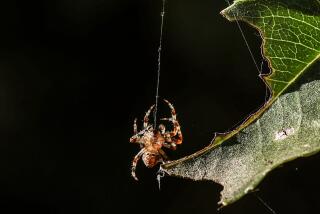Rose Study Puts Spider Mites in a Better Light
- Share via
Roses can tolerate relatively high spider mite density without loss in yield or quality, according to University of California research.
Controlling spider mites is a major problem for most commercial rose growers.
The study, designed to evaluate the effects of different mite population levels on growth and yield, suggests that fewer acaracide applications may be sufficient to preserve quality, according to California Agriculture magazine, published by the university’s agriculture and natural resources division.
Presumably the study also would apply in a home garden environment, although the researchers drew no such conclusions. Reduced spraying is the keystone of integrated pest management procedures that have become very popular in recent years.
The study used a sampling technique to assess spider mite populations in the commercial rose fields of California’s Kern County, which produces the majority of rose bushes sold in this country.
Peace variety roses growing on Dr. Huey rootstock were checked.
“During the course of monitoring, especially in the first year, we often noticed mite predators such as western flower thrips, minute pirate bug and predatory mites in the field,” researchers John F. Karlik, Peter B. Goodell and Gary W. Osteen reported in 1995.
“These insects probably were able to thrive and aid in spider mite control because of few insecticide or acaracide applications to the surrounding mother block, and none to the guard rows.”
The field study began in 1990.
“In the past, growers controlled mites by treating rose fields with acaracide four to eight times per season, with as many as 13 applications in some years,” said the researchers.
“But frequent use of acaracides may create problems. Repeated applications are suspected of selecting for resistant spider mite populations; in other words, changing the spider mite population so that the hardier mites predominate, which can make them difficult to control in other crops. Worker safety and environmental concerns also argue for reducing acaracide applications when possible.”






